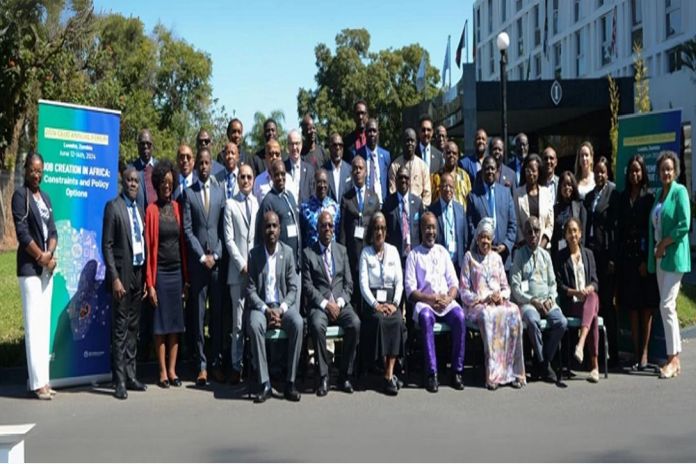Today’s political chief executive is expected to play a significant role in driving economic policy. Heads of state have always been expected to set the vision for the work of government through leading cabinet and managing the political expectations of a wide range of stakeholders.
As such, the role of an economic advisor requires a technical toolkit and experience, coupled with political intelligence, if the holder is not a practicing politician. The execution of the role requires a dynamic and curatorial approach to problem-solving. As I learned from my term as economic advisor to South Africa’s President Cyril Ramaphosa, it is consequential for economic advisors to maintain strong relationships with the actors producing economic thought leadership in academia, think tanks, and financial markets.
Further, convening workshops and other thought leadership gatherings help to infuse government thinking with new and emerging insights. Since 2018, the Chief Economists of Government (CEoG) Network has played an integral role in supporting these convenings. In this blog, I’m sharing some thoughts on what I have witnessed, learned, and what I feel is important for the role.
CEoG is a unique network that supports economic advisors on the African continent to learn from peers holding similar roles. The network also provides crucial research support, in the form of research fellows, and data analysis tools. By helping advisers work on joint projects, CEoG strengthens the continental voice on matters of mutual interest.
In Africa’s recent years, the need to support the role of economic advisors has gained importance as opportunities and crises continue, including the just energy transition, the response to the COVID-19 pandemic, and an increasingly complicated geo-economic environment. These challenges and opportunities cut across various ministries and institutions, calling for a whole-of-government approach and strong economic governance at the center.
There are many institutions that drive economic governance, including finance ministries, central banks and line ministries with an economic mandate. To lead this complex web of institutions, the head of state needs dedicated resources that take a comprehensive view of these different actors and help them to drive an economic agenda on a daily basis. This is a role that is tied to the pace, schedule, and demands of the head of state. Yet core economic leaders across the state should be consulted and given the space to provide their institutionally rooted perspectives. The role of an economic advisor at the center of government is not to supplant or compete with the web of actors in place.
The critical functions of an economic advisor include:
- Presenting the head of state with fact-based analysis to support decision-making.
- Providing input into key documents such as major policy speeches, responses to the legislature, briefing notes.
- Reviewing key incoming documents, such as cabinet memos, briefing notes for major initiatives/events/international engagements, with a view towards ensuring that decisions and statements stand up to economic logic and empirical evidence.
- Contributing to target setting for key programmes and for assessing ministerial performance, to ensure coordination and coherence.
- Driving any special presidential initiatives.
During my time as an economic advisor in South Africa, between 2018 and 2024, some of the flagship initiatives that required a holistic government approach have been: fixed capital formation levels, a complex just energy transition negotiation with international partners (JET-P), post-COVID-19 public employment programs, and the structural reform program, Operation Vulindlela.
In driving the country’s investment mobilization drive, the presidency enjoyed good support from cabinet members and the operational support of strong agencies, especially the Industrial Development Cooperation. With this support, the investment drive met the high-level objectives set by the center. However, it could be argued that these efforts did not fundamentally change institutions on the ground such as the Investment Mobilisation Agency, nor did they alter the course of fixed capital formation, which remains a low 14 percent of GDP.
The just energy transition partnership underscored the importance of building enough common ground with experts from line ministries and departments to enable forward movement, even if there are points of divergence. The South Africa’s Just Energy Transition Implementation Plan was approved by cabinet, against the context of a long-standing debate on the pace of the transition, its impact on coal-dependent communities, and the perceived double standards of the West in placing their energy security above the transition, particularly since the beginning of the war in Ukraine.
The roll-out of public employment programmes depended on developing a deep partnership with National Treasury on budget allocation. The presidential employment stimulus had to be constantly balanced against other pressing needs in a fiscally constrained environment with increasingly challenging debt dynamics.
Finally, Operation Vulindlela’s purpose to remove some key binding constraints to growth, scored success on the back of sustained political sponsorship by key ministers and the president, who launched it at a joint sitting of parliament in October 2020.
All of these initiatives required my coordination, analytical input, and stewardship as economic advisor, in addition to other staff in the presidency.
Ultimately, economic advisors at the center are enmeshed into the institutions and personalities of government. Yet, this is a role that comes with few predecessors and is not well understood. It then becomes important to draw on international perspectives and resources. CEoG is creating a network for this. And in an increasingly complex world, those who labor from the center of government, especially economic advisors, will continue to benefit immensely from the growing CEoG network.





